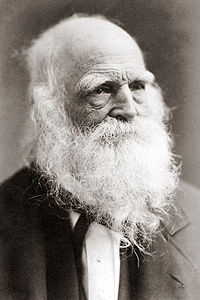The Two Graves
William Cullen Bryant 1794 (Cummington) – 1878 (New York City)
'Tis a bleak wild hill,--but green and bright
In the summer warmth and the mid-day light;
There's the hum of the bee and the chirp of the wren,
And the dash of the brook from the alder glen;
There's the sound of a bell from the scattered flock,
And the shade of the beech lies cool on the rock,
And fresh from the west is the free wind's breath,--
There is nothing here that speaks of death.
Far yonder, where orchards and gardens lie,
And dwellings cluster, 'tis there men die.
They are born, they die, and are buried near,
Where the populous grave-yard lightens the bier;
For strict and close are the ties that bind
In death the children of human-kind;
Yea, stricter and closer than those of life,--
'Tis a neighbourhood that knows no strife.
They are noiselessly gathered--friend and foe--
To the still and dark assemblies below:
Without a frown or a smile they meet,
Each pale and calm in his winding-sheet;
In that sullen home of peace and gloom,
Crowded, like guests in a banquet-room.
Yet there are graves in this lonely spot,
Two humble graves,--but I meet them not.
I have seen them,--eighteen years are past,
Since I found their place in the brambles last,--
The place where, fifty winters ago,
An aged man in his locks of snow,
And an aged matron, withered with years,
Were solemnly laid!--but not with tears.
For none, who sat by the light of their hearth,
Beheld their coffins covered with earth;
Their kindred were far, and their children dead,
When the funeral prayer was coldly said.
Two low green hillocks, two small gray stones,
Rose over the place that held their bones;
But the grassy hillocks are levelled again,
And the keenest eye might search in vain,
'Mong briers, and ferns, and paths of sheep,
For the spot where the aged couple sleep.
Yet well might they lay, beneath the soil
Of this lonely spot, that man of toil,
And trench the strong hard mould with the spade,
Where never before a grave was made;
For he hewed the dark old woods away,
And gave the virgin fields to the day;
And the gourd and the bean, beside his door,
Bloomed where their flowers ne'er opened before;
And the maize stood up; and the bearded rye
Bent low in the breath of an unknown sky.
'Tis said that when life is ended here,
The spirit is borne to a distant sphere;
That it visits its earthly home no more,
Nor looks on the haunts it loved before.
But why should the bodiless soul be sent
Far off, to a long, long banishment?
Talk not of the light and the living green!
It will pine for the dear familiar scene;
It will yearn, in that strange bright world, to behold
The rock and the stream it knew of old.
'Tis a cruel creed, believe it not!
Death to the good is a milder lot.
They are here,--they are here,--that harmless pair,
In the yellow sunshine and flowing air,
In the light cloud-shadows that slowly pass,
In the sounds that rise from the murmuring grass.
They sit where their humble cottage stood,
They walk by the waving edge of the wood,
And list to the long-accustomed flow
Of the brook that wets the rocks below.
Patient, and peaceful, and passionless,
As seasons on seasons swiftly press,
They watch, and wait, and linger around,
Till the day when their bodies shall leave the ground.
Font size:
Submitted on May 13, 2011
Modified on March 05, 2023
- 2:59 min read
- 48 Views
Quick analysis:
| Scheme | AABBCCDD EEFGHHIIJJKKLL MMNNJJOXXXPP QQBXRR SSTTUUVVEE GFVVXXWWXX MMYYZZ1 1 JJOX2 2 |
|---|---|
| Closest metre | Iambic pentameter |
| Characters | 3,136 |
| Words | 594 |
| Stanzas | 7 |
| Stanza Lengths | 8, 14, 12, 6, 10, 10, 14 |
Translation
Find a translation for this poem in other languages:
Select another language:
- - Select -
- 简体中文 (Chinese - Simplified)
- 繁體中文 (Chinese - Traditional)
- Español (Spanish)
- Esperanto (Esperanto)
- 日本語 (Japanese)
- Português (Portuguese)
- Deutsch (German)
- العربية (Arabic)
- Français (French)
- Русский (Russian)
- ಕನ್ನಡ (Kannada)
- 한국어 (Korean)
- עברית (Hebrew)
- Gaeilge (Irish)
- Українська (Ukrainian)
- اردو (Urdu)
- Magyar (Hungarian)
- मानक हिन्दी (Hindi)
- Indonesia (Indonesian)
- Italiano (Italian)
- தமிழ் (Tamil)
- Türkçe (Turkish)
- తెలుగు (Telugu)
- ภาษาไทย (Thai)
- Tiếng Việt (Vietnamese)
- Čeština (Czech)
- Polski (Polish)
- Bahasa Indonesia (Indonesian)
- Românește (Romanian)
- Nederlands (Dutch)
- Ελληνικά (Greek)
- Latinum (Latin)
- Svenska (Swedish)
- Dansk (Danish)
- Suomi (Finnish)
- فارسی (Persian)
- ייִדיש (Yiddish)
- հայերեն (Armenian)
- Norsk (Norwegian)
- English (English)
Citation
Use the citation below to add this poem to your bibliography:
Style:MLAChicagoAPA
"The Two Graves" Poetry.com. STANDS4 LLC, 2024. Web. 18 Apr. 2024. <https://www.poetry.com/poem/40381/the-two-graves>.



Discuss the poem The Two Graves with the community...
Report Comment
We're doing our best to make sure our content is useful, accurate and safe.
If by any chance you spot an inappropriate comment while navigating through our website please use this form to let us know, and we'll take care of it shortly.
Attachment
You need to be logged in to favorite.
Log In